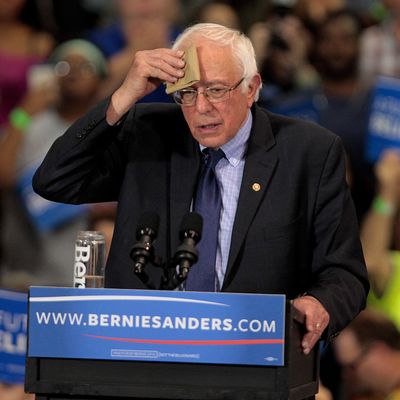
Among center-left health-care analysts, there is very little disagreement that Bernie Sanders says a lot of things on the subject that are misleading or wrong, and that his bill stands little chance of enactment even if Democrats win full control of government. His defenders instead make a different argument: By taking extreme positions, they say, Sanders creates more political room for rational reforms to take hold.
The Sanders bill “solves precisely none of the problems that have foiled every other single-payer plan in American history,” concedes Ezra Klein, “[b]ut it stands an excellent chance of getting the country quite a lot closer to single-payer.” Clio Chang argues it “open[s] the door for all kinds of fixes to a system that nearly everyone agrees is too expensive and too inefficient.” Jared Bernstein agrees: “For far too long, Democrats have way over-negotiated with themselves, starting debates where they wanted to end up, and getting pushed hard to the right by conservatives. Sanders’s plan is one of the few I’ve seen for a long while that sees the folly in this and takes strong, corrective action.”
It is possible that this is true. On the other hard, it’s possible it’s not. Politics is difficult to predict, and events often have unforeseeable ramifications. Defending his bill as a force for good, without defending either its contents or the analysis behind it, puts a lot of weight on these uncertain processes while ignoring things that are more plainly discernible.
There is a virtual consensus among progressives that the United States would be much better off if it had implemented single-payer insurance, or some other national health-care plan used by industrialized democracies, many decades ago. Instead, the American health-care system grew up around the malformed incentives created by employer-sponsored insurance and fee-for-service medicine. The astronomical cost of medical care, the deep fear of change among the insured, and the entrenched interests of providers have all made the system nearly impervious to systemic reform.
Sanders has not cracked this problem. Nobody really claims he has, or even claims that he has grappled with it. His alleged contribution is to refuse to acknowledge the problem at all. He assumes implausibly large savings, and dismisses fiscal estimates of the cost of his plan as rigged by crooked drug companies. He tells a different, much simpler story than other Democratic politicians. In his words, the only important question is a conviction about the morality of universal insurance, and only obstacle to progress is the profits of the insurance and drug industry. (He omits doctors and hospitals, not to mention change-averse voters themselves.)
This is helpful if you believe heavily in the “Overton window,” a theory of politics which holds that the main trick is to have your favored idea framed as the centrist option between “radical” alternatives on either side. By moving the window left, Sanders creates space for practical alternatives, like a public option and Medicare enrollment for people aged 55–65. Meanwhile, he energizes the base with a simple, clear reason to pull the Democratic lever. “Medicare for all as a goal is a way to activate movement politics, to give people a reason to go to the polls and make phone calls,” argues Chang.
Suppose it is true that the promise of Medicare for all will entice a significant number of voters for whom the prospect of voting out Donald Trump and his plutocratic governing allies is not sufficient incentive. What happens after the Democrats inevitably fail to enact Medicare for all? Do the activists inspired by this slogan take their half a loaf in good cheer and resume their efforts? Or do they collapse into disillusioned recriminations at the corporate sellout Democrats who betrayed them? The latter is what happened after the passage of the Affordable Care Act, which, beset from all sides by hysterical criticism on the right and churlish disappointment on the left, registered depressed polling for years.
The theory also dismisses the possibility that the candidates who endorse the Sanders plan open themselves up to the attack that they favor a large middle-class tax hike. The Sanders plan attempts to deflect this vulnerability by leavings its financing mechanism open-ended as a list of suggested revenue-raisers. It will work if candidates can get away with attaching themselves to the promised benefits of his plan without committing themselves to the pay-fors it requires. Republican politicians often get away with this kind of legerdemain — but only because they benefit from a partisan right-wing media ecosystem. Democrats need to run the gauntlet of an independent news media that is unlikely to let them run around promising trillions of dollars in new spending without trillions of dollars in new taxes.
Again, it might work. But the mechanism by which it would is fairly perverse. It assumes that incremental progress is best achieved by denying the need for incremental progress. The liberal blogger Daniel Davies once wrote, in what became a widely cited aphorism, “Good ideas do not need lots of lies told about them in order to gain public acceptance.” Sanderscare seems to assume the opposite.






























